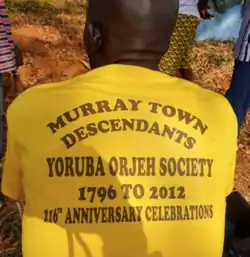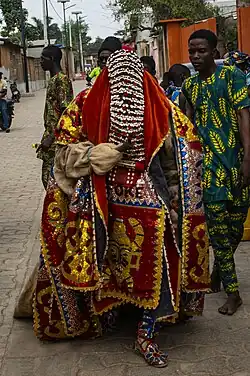Ojeh Society
| Ojeh Society | |
|---|---|
  | |
| Founded | 1850.[1][2] Hastings[3] |
| Type | Fraternal order |
| Affiliation | Independent |
| Status | Active |
| Emphasis | Yorubas; Okus, Akus (Krio) Temnes[4] Lokos (Landogos) Sherbros[4] Kurankos Mandingos[4] |
| Scope | International: |
The Ojeh, Oje or Egungun society[1][4] Yoruba: Ọjẹ (Ɔjɛ), Egúngún, is a fraternal institution in the West African countries of Sierra Leone and The Gambia. The society emerged from within the ranks of liberated Africans in the surrounding villages on the Freetown peninsula such as Hastings, Waterloo, Aberdeen and Murray Town of the Sierra Leone colony and subsequently, in Freetown during the mid 19th century.[5] By the mid 1800's, there were nearly 60,000 of these Yoruba people in Freetown known by the collective name Aku.[6] It is a part of the larger Egungun tradition, and the name of the group itself is the customary appellation of the society of those who are members of the Egungun cult in Yorubaland, who are called Ọlọjẹs.
Other groups related to the Ojeh are the Gelede, Egunuko and Ode or Odeh Societies, Yoruba: Gẹ̀lẹ̀dẹ́ (Gɛlɛdɛ), Ìgùnùko, Ọdẹ (Ɔdɛ). The Odeh society is commonly called Odelay/Odilleh, the name of its first group formed by Adekumbile Odileh Cole who was its 'Ashipa' (leader) and after whom the group itself was named.[1] However, members of this latter group are much more concerned and associated with the affairs of hunting and chivalry, even though all four societies are very much intertwined given their similar origins.
Origin and Development
Initially a society that started out among the Creoles, the Ojeh institution was initially closed to outsiders, unlike the Bata Akoto, Agbay and Ajuba groups that were open access to all members of society.[1] The environment in which Ojeh developed was one characterized by adversity and persecution, as the colonial government tried desperately to suppress Yoruba cultural institutions and influences in the colony, in their quest of "civilizing the natives".[1] Furthermore, the influence and Power of the Ojeh irritated both the CMS clergy and prominent Muslim Imams in places like Fourah Bay and Aberdeen.[1] Ironically, they were not opposed to membership and proliferation of Freemasonry, and even sometimes actively encouraged membership.[7]
Despite all the suppression and attempts at discouraging people from allegiance/devotion to Yoruba culture,[1] the belief system did not abate significantly. They instead adapted and went underground, and it wasn't until the 1880s when their leaders felt assured enough that they were able to re-emerge in the open. Some earlier authors were of the opinion that Initially, there was a class divide among practitioners of Oje, and that In pioneering groups like the Oke Mauri (Okemury) in Freetown, the upper class among the Creoles largely stayed away, while their membership ranks were filled with artisans, self employed, unemployed and unskilled workers. Regardless, the Ojeh societies had several educated creoles as members, and they became beacons of solidarity and resistance, attracting members belonging to different religious affiliation, Christians, Muslims and Orisha adherents alike, irrespective of religious or socio-economic differences.[1] Later on, groups of emigre creoles from Sierra Leone introduced the society into places like Bathurst, Gambia (now Banjul) planting new lodges/communities there. The first of these pioneers in Bathurst was Johnston Erubamie Williams.[8]
20th Century growth

A new phase of development began in the 20th century when the Ojeh experienced an explosive growth. It spread rapidly, carried by groups of migrant workers from the Sierra Leonian hinterland who took the practice and spread it all over the colony/country from one nodal town to another. Today, many other ethnic groups are engaged in, and enjoy various activities as active members of the Ojeh, and the various Ojeh (Egungun) lodges count members from among all the major ethnic groups of the country in rural and urban areas alike, including from among the Temnes, Sherbros, Mendes, Kurankos, Lokos, Mandingos and others.[5]
Structure and Beliefs
The Ojeh operate as different societies 'Lodges', which are subgroups with thousands of members having their own local leadership. A leader is known as an Agba, a word which mens Elder or Patron, and is a title that denotes and confers the privilege of seniority on its bearer.[9] The Orisha Ogun is a powerful influence in both the Ojeh and Odeh institutions.[1] Unlike the Ojeh and Odeh societies where the members/votaries are primarily men, the Gelede society, also present in Sierra Leone admits both men and women as members.[1]


Language and Chants
The language of the Ojeh, Odeh and other associated societies, and indeed the Egugu itself is Yoruba.[10] Devotees and Initiates have several songs, chants and words in Yoruba which they chant, sing and use in their usually large processionary festivals and outings, many of which take place during important events including national public holidays.[3] There are also entire musical albums of the Ojeh genre that have been produced by such artists as Ramanu Davies and Abu Whyte which have been commercialized and made available for public consumption.[10]
They also organize carnivals where colorful elaborate masquerades are displayed to the gleeful view of thousands who participate in call and response musical compositions, while society members wear group uniforms based on chosen fabric and styles with walking sticks called Ashobi (Aso-Ebi).[11]
Influence & Legacy
Since its inception in the mid 19th century, the Ojeh societies have been known to maintain and enforce societal order.[1] Non-members from the communities have the widespread belief that the Egugu are aware of everything happening or transpiring in any given community. The perception of Oje was as such, one of a sort of Watchdog institution that had the ability and moral obligation to hold offenders or trespassers accountable.[1]
In modern Sierra Leone and The Gambia, the Ojeh societies operate in some areas as elite social clubs, often having members of leading political parties in their ranks.[3] They are also important in the rural communities as they organize competitions and other activities geared towards community building.[12] The various Ojeh societies can be highly competitive between themselves, with each group trying to outdo the other in prestige and flamboyance,[10] and there have even been cases of clashes between groups over territory.
The Ojeh society has also been transported by the Sierra Leone and Gambian diasporas to their new countries of residence all across the world. One good example is the Ohio Paddle in the USA.[11]
List of some Ojeh Lodges/Groups/Societies
- Sierra Leone[3]
- Awodi Ojeh Society (Freetown)
- Elayfeh (Ile Ife) Ojeh Society
- Big Oba Sai Ojeh Society,
- Tourist (Fourah Bay) Ojeh Society
- Agba Kolleh Ojeh Society,
- Seaside Ojeh Society
- Independent Ojeh Society
- Okaymorie Ojeh Society
- Navy Ojeh Society
- Kanikay Ojeh Society
- Republic Ojeh Society
- Limba Ojeh 1
- Limba Ojeh 2
- Bankasoka Ojeh Society
- Sabanoh Yoruba Ojeh Society
- Big Paris Ojeh Society
- The Gambia
- Ekun Baba Odeh
- Awodi Ojeh Society (Banjul)
- Okemorie (Okemaury) Society
- Odilleh Society
- Young Rising Ojeh Society
See also
- Egungun
- Secret society
- Poro society
- Odelay Society
- Gelede
References
- ^ a b c d e f g h i j k l Cole 2013.
- ^ Højbjerg, Christian K.; Knörr, Jacqueline; Murphy, William P. (15 November 2016). Politics and Policies in Upper Guinea Coast Societies: Change and Continuity. Springer. p. 47. ISBN 978-1-349-95013-3.
- ^ a b c d European Union Agency for Asylum (formerly: European Asylum Support Office, EASO (29 October 2018). "The Ojeh/Oje society [Q123]". www.ecoi.net. Retrieved 16 July 2025.
- ^ a b c d Ménard 2023.
- ^ a b "Ojeh Society". www.sierraleoneheritage.org. Retrieved 15 July 2025.
- ^ "This Documentary Shows Sierra Leone's Deep Debul Parade Tradition | OkayAfrica". www.okayafrica.com. Retrieved 16 July 2025.
- ^ Dixon-Fyle, Mac; Cole, Gibril Raschid (2006). New Perspectives on the Sierra Leone Krio. Peter Lang. p. 46. ISBN 978-0-8204-7937-8.
- ^ "Awo Suku Awo "O'much Aa Caitch Tiday?" – The Standard Newspaper | Gambia". 28 January 2022. Retrieved 15 July 2025.
- ^ "Update! Uneasy Calm Returns to Central Freetown After Ojeh-Linked Tensions – Cocorioko". Retrieved 15 July 2025.
- ^ a b c Ojukutu-Macauley, Sylvia; Rashid, Ismail (10 October 2013). The Paradoxes of History and Memory in Post-Colonial Sierra Leone. Bloomsbury Publishing PLC. p. 219. ISBN 978-0-7391-8003-7. Retrieved 20 July 2025.
- ^ a b Kargbo, Lamin (26 June 2023). "Keeping Sierra Leone's Culture Alive – Ohio Paddle is back!". SwitSalone. Retrieved 16 July 2025.
- ^ Lamin, Tamba. "SLPP declares support for APC councilor – Sierra Express Media". Retrieved 16 July 2025.
Bibliography
- Cole, Gibril R. (15 September 2013). The Krio of West Africa: Islam, Culture, Creolization, and Colonialism in the Nineteenth Century. Ohio University Press. ISBN 978-0-8214-4478-8. Retrieved 15 July 2025.
- Ménard, Anaïs (14 April 2023). Integrating Strangers: Sherbro Identity and The Politics of Reciprocity Along the Sierra Leonean Coast. Berghahn Books. ISBN 978-1-80073-840-9.